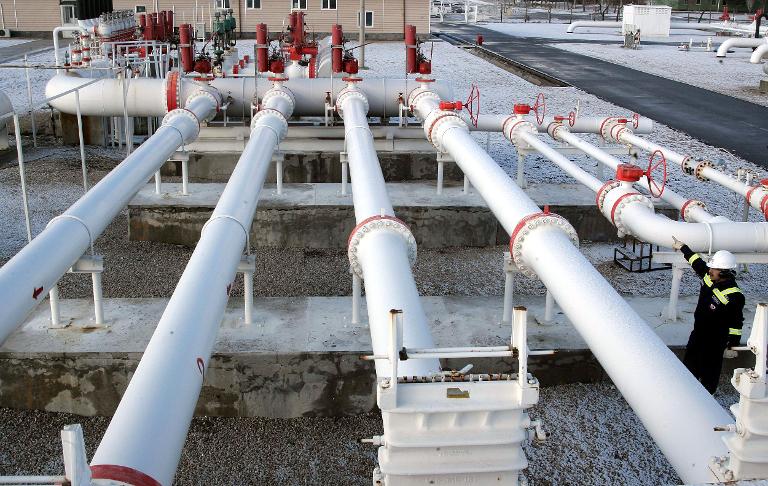
Turkey launches work on pipeline to pump Azeri gas to Europe
Turkish President Recep Tayyip Erdogan, Azerbaijani counterpart Ilham Aliyev and Georgian President Giorgi Margvelashvili simultaneously pushed three buttons to launch work at the eastern end of the pipeline in the ceremony in the Kars region of eastern Turkey.
"In the name of God!" said the pious Erdogan as he pushed the button to the booming sound of the theme music from the film "Pirates of the Caribbean" in the televised ceremony.
The EU, whose energy commissioner Maros Sefcovic was at the ceremony, is backing the project as part of its Southern Corridor policy to bring gas from new eastern markets and reduce dependence on Russia for supplies.
The 1,850 kilometre (1,150 mile) Trans-Anatolian Natural Gas Pipeline (TANAP) pipeline -- which is due to be completed in 2018 -- is to link up to the existing South Caucasus Pipeline (SCP) which links Turkey to the Azerbaijani gas fields in the Caspian Sea through Georgia.
The backers of the project expect that the TANAP will then link up with the planned Trans-Adriatic Pipeline (TAP) that will bring the gas from western Turkey to Greece, Albania and across the Adriatic to Italy.
- 'Project of peace' -
The pipelines avoid Armenia, with whom Azerbaijan and Turkey have frozen ties due to the Nagorny-Karabakh conflict and the dispute over the mass killings of Armenians in World War I.
But Erdogan said the pipeline would not only carry Shah Deniz gas to Europe but also "carry peace".
"Oil and natural gas projects are unfortunately associated in the world with conflicts, competitions, fights, wars and exploitation. I believe that this project will be remembered with peace and welfare," he said.
He confirmed the project would cost $10 billion, far more than when it was originally conceived in 2012.
According to the partnership agreement signed last week, Azerbaijan's state energy firm SOCAR and Turkey's Botas will hold 58 percent and 30 percent stakes respectively while British energy giant BP has a 12 percent share.
"Without TANAP you cannot get Azerbaijani gas across Turkey," said Laurent Ruseckas, senior advisor in global gas at IHS Energy in London.
"The development of Shah Deniz 2 depends on getting all the pipelines from the Caspian Sea to Italy built and a big part of that is TANAP."
- 'Small share of overall market' -
The total investment in Shah Deniz 2, including the cost of the pipeline infrastructure, is $40-45 billion.
The field will have 16 billion cubic metres (bcm) of gas production per year with 6 bcm pumped to Turkish consumers and 10 bcm sent to Europe.
"This is a small share of the overall market," commented Ruseckas, who projects total consumption this year in the EU at 444 bcm.
Erdogan said annual volumes would eventually increase to a capacity of shipping 22 bcm and subsequently 31 bcm.
However Turkey, whose relations with Moscow have warmed considerably in recent years, is also talking with Russia on a new Turkish Stream pipeline that will pump Russian gas under the Black Sea to its territory and Europe.
The Turkish Stream pipeline is aimed at replacing Russia's South Stream project for pumping gas to Europe avoiding Ukraine, which President Vladimir Putin dramatically pulled last year citing a lack of cooperation from the EU.
Russia has expressed doubts about the TANAP project with its envoy to the European Union Vladimir Chizov saying it was "extremely challenging from a technical point of view" and "exorbitantly expensive".
However Turkish Energy Minister Taner Yildiz said that TANAP was not a rival to Turkish Stream, whose final terms are still being negotiated with Russia.
"TANAP should not contradict Turkish Stream because these two projects intend to carry gas from two different sources -- Russia and Azerbaijan," said Chi-Kong Chyong at the European Council on Foreign Relations.

Legal Disclaimer:
MENAFN provides the
information “as is” without warranty of any kind. We do not accept
any responsibility or liability for the accuracy, content, images,
videos, licenses, completeness, legality, or reliability of the information
contained in this article. If you have any complaints or copyright
issues related to this article, kindly contact the provider above.


















Comments
No comment